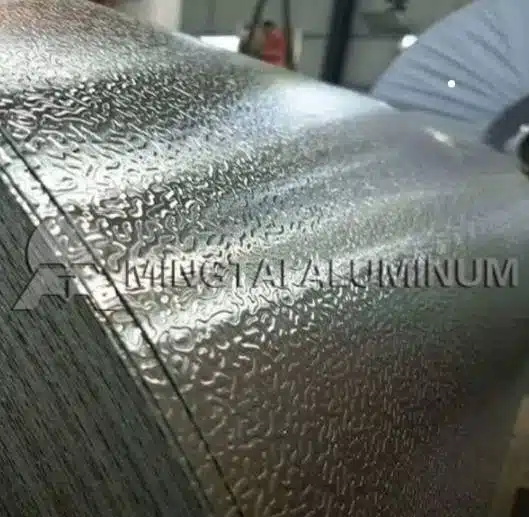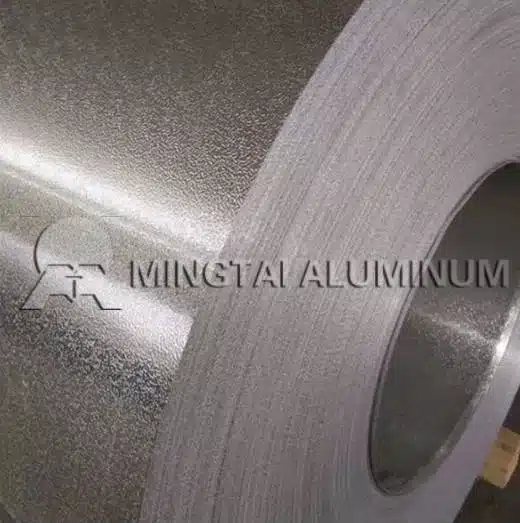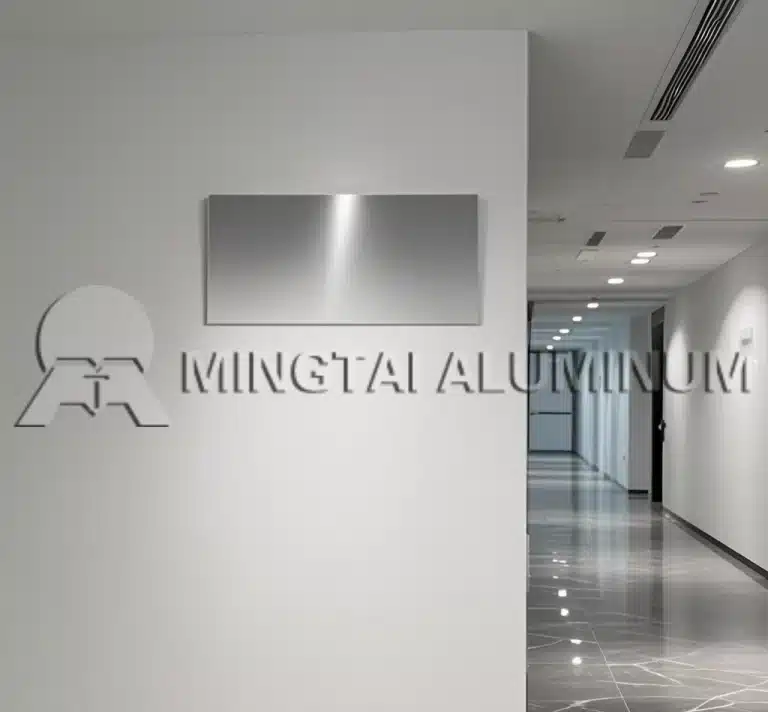
Introduction: What Is an Embossed Aluminium Coil
If you’ve ever run your hand across a sheet of aluminium that feels bumpy or textured instead of smooth — that’s an embossed aluminium coil.
It’s basically aluminum that’s been pressed through patterned rollers to get that raised look. The texture isn’t just for show. It adds grip, hides small scratches, and makes the metal tougher without adding weight.
You’ll spot it in plenty of places — on a truck body, around HVAC ducts, even inside a washing machine.
At MINGTAI ALUMINUM, these coils come off precision lines where every roll looks the same from start to finish, pattern after pattern. Clean, sharp, reliable — just how industrial buyers like it.
How Is an Embossed Aluminium Coil Made
The process sounds simple, but getting it right takes experience.
It starts with flat aluminum sheet — sometimes pure, sometimes alloyed — rolled down to the required thickness. Then the sheet passes through heavy rollers that “stamp” the surface texture. Heat and pressure fix the design for good.
You might imagine it like ironing a shirt — only in reverse. The roller doesn’t smooth the metal, it gives it wrinkles on purpose.
After that, depending on where the coil will go, it might get anodized, color-coated, or laminated with Polysurlyn for insulation work. The result? A shiny, patterned coil ready to wrap a pipeline or decorate a building panel.
Common Embossing Patterns
Not all patterns are the same. Each serves a slightly different job. Here are the usual suspects:
- Stucco pattern – Looks like an orange peel. You’ll see it often on insulation jacketing and building walls. It’s the most common type by far.
- Diamond pattern – Great grip, often used for truck floors or stairs. You won’t slip on this one.
- 5 bar pattern – Found on machine covers or industrial panels; easy to clean and surprisingly stiff.
Most factories stick to stucco because it’s easy to produce and hides dents. But for something like a trailer floor, the diamond pattern is worth the extra effort.
Alloy Grades and Tempers Used
Here’s where it gets a bit technical. Not all embossed aluminium coils are made from the same metal blend.
MINGTAI ALUMINUM works with several alloy series:
- 5052 aluminium coil – This Al-Mg alloy is tough, corrosion-resistant, and easy to weld. Common in marine gear and building cladding.
- 6063 aluminium coil – Known for smooth forming and beautiful anodized finishes. Often used where appearance matters.
- 5005, 5754, 3005, and 3105 – These are the everyday workhorses — stable, strongand resistant to outdoor conditions.
You’ll usually find tempers like H14, H16, and H24. The “H” simply tells you how hard it is. A harder coil bends less, so it’s chosen for high-load areas like truck panels.
Key Advantages of Embossed Aluminium Coils
Lightweight yet durable
You can carry a big panel of aluminium with one hand, yet it’ll last for years. That’s why builders love it — strong but not backbreaking to move.
Anti-slip surface
The texture gives traction. Perfect for wet floors, stair steps, or machine walkways where you don’t want to risk a slip. Some factories even specify diamond-embossed plates for worker safety zones.
Corrosion and weather resistance
Alloys like 5005 or 5052 handle moisture and salt air pretty well. They’re used near the sea, on cold-storage walls, or anywhere rust would be a headache.
Aesthetic appeal
Let’s face it — shiny patterned metal looks good. It hides fingerprints, resists scratches, and makes dull walls look a bit more high-end.
Improved rigidity
Embossing adds stiffness without adding weight. It’s a neat engineering trick — the raised surface geometry distributes stress better, like ridges on cardboard.
Typical Applications
Building & Construction
In construction, you’ll find embossed aluminium coils on roofing, wall cladding, and ceilings.
They hold up well under sunlight, and that light texture keeps things looking clean even if dust builds up.
Transportation
Truck floors, trailer sides, or toolboxes — all love embossed coils. The pattern keeps surfaces safe to walk on, and aluminum’s low weight saves fuel.
One truck builder once said switching from steel to embossed aluminum shaved 180 kg off a single trailer. That’s real savings.
HVAC & Insulation
If you’ve ever looked at insulated pipes in a refinery or chiller plant, those shiny silver jackets? Most are stucco embossed aluminium coils laminated with Polysurlyn Moisture Barrier (PSMB).
They resist water, protect insulation foam, and handle heat cycles without warping.
Home Appliances
Inside refrigerators, washing machines, and ovens, embossed panels add texture and strength. It’s partly design, partly function — the small ridges help with airflow and heat dissipation.
Industrial Equipment
Machine housings, protective guards, even control boxes — anywhere that needs toughness plus a clean look. Embossed aluminium does the job.
Thickness, Width, and Surface Options
MINGTAI ALUMINUM makes coils in different specs, depending on where you’re using them.
- Thickness: usually 0.2 – 1.5 mm;
- Width: from 100 mm up to 2550 mm — wide enough for industrial cladding sheets.
That flexibility means you can order a coil ready for your production line — no extra prep needed.

To sum it up — an embossed aluminium coil isn’t just a shiny piece of metal. It’s a clever mix of engineering and design.
Lightweight but solid, eye-catching yet practical. You’ll find it on buildings, machines, trucks, and air ducts everywhere.
At MINGTAI ALUMINUM, these coils are rolled, patterned, and tested to international standards before shipping. Each batch gets visual and mechanical checks, because in the real world, even a small surface flaw can matter.
If you’re planning a construction or insulation project and need reliable, corrosion-resistant material, it’s worth asking MINGTAI ALUMINUM for samples or a quick quote. You might be surprised how many industries already rely on this unassuming metal roll.
FAQ
Q: What’s the main difference between an embossed aluminium coil and a flat one?
A: The embossed version has a raised surface — kind of like an orange peel texture — that improves grip and hides small dents. Flat sheets are smooth and usually used where a polished finish matters more than traction.
Q: Where do people usually use embossed aluminium coil?
A: Everywhere, honestly. In building facades, insulation jackets, truck floors, or decorative panels. It’s the go-to for anyone who needs something that looks good and lasts.
Q: Which alloys work best for embossed aluminium coils?
A: Alloys like 5052, 5005, 5754, 3003, and 6063 are the most popular. Each offers a different mix of strength, flexibility, and corrosion resistance depending on your project.
Q: Can embossed aluminium coil be color coated or anodized?
A: Sure can. Many coils get a color coat, anodized finish, or Polysurlyn lamination depending on the application — outdoor, indoor, or insulation.




